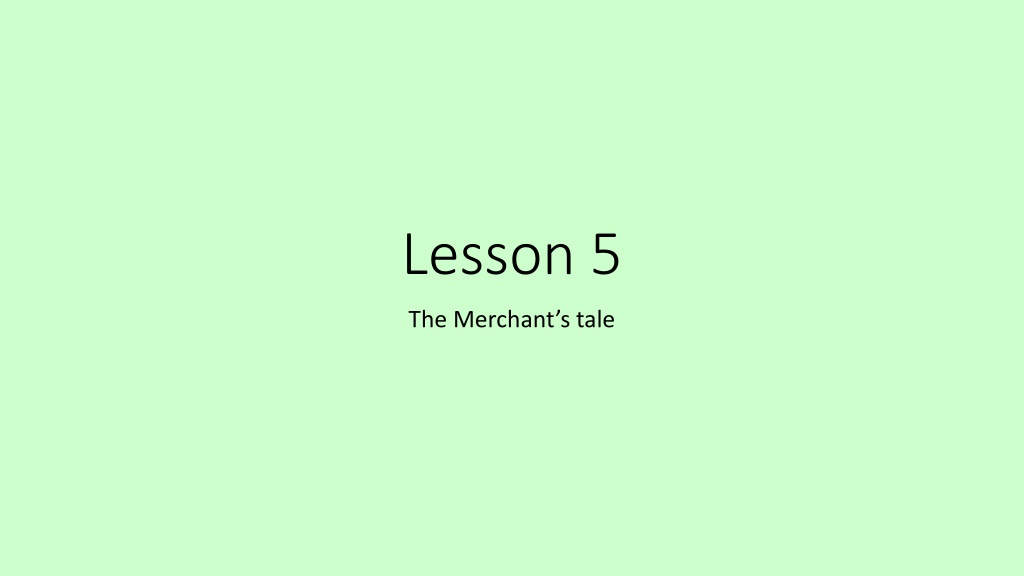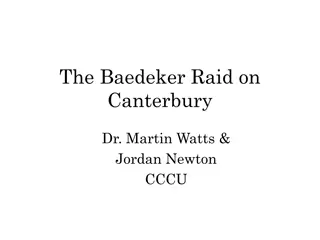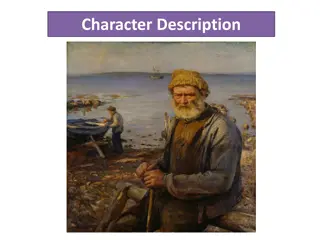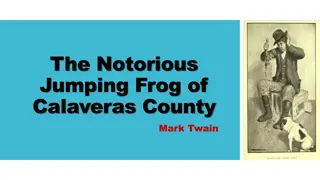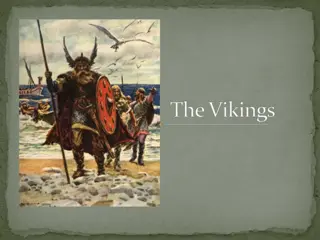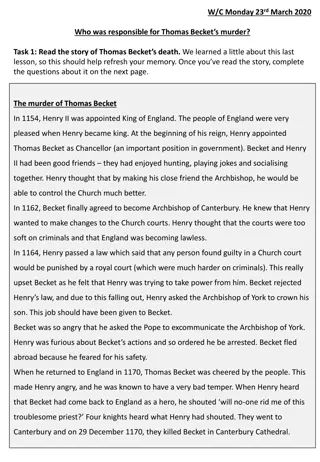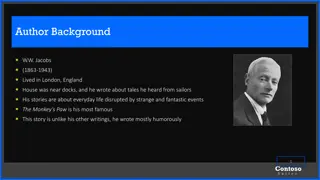The Merchant's Character in Canterbury Tales
The Merchant in Chaucer's Canterbury Tales is described as dressed in motley attire and involved in trade via Middleburg and Orwell ports. Despite being portrayed as worthy in business dealings, Chaucer hints at shady practices, contrasting him with the Knight. The character reflects concerns of trade routes, piracy, and business reputation.
Download Presentation

Please find below an Image/Link to download the presentation.
The content on the website is provided AS IS for your information and personal use only. It may not be sold, licensed, or shared on other websites without obtaining consent from the author. Download presentation by click this link. If you encounter any issues during the download, it is possible that the publisher has removed the file from their server.
E N D
Presentation Transcript
Lesson 5 The Merchant s tale
Frame narratives Read the text and then answer the following questions: 1. Who is the central character in A Thousand and One nights and how does she evade execution? 2. What was the Decameron about? 3. How many stories had Chaucer planned to have originally in his Canterbury Tales? Stretch: In your opinion, what makes The Canterbury Tales a frame narrative? Stories held together in some sort of framework are called FRAME STORIES - stories which are in some way connected or held together in a common framework. There have been several examples of these story collections. Perhaps the most famous collection of stories is The Arabian Nights Entertainment, sometimes called A Thousand and One Nights. This collection of stories was originally written in Arabic. The central character in this framework is Scheherazade who is under sentence of death from her husband. She puts off her execution by telling him a story each night and not revealing the end of it until the following night - when she starts another story. The collection includes such well-known stories as Aladdin and Sinbad the Sailor. Another well-known collection of stories is the Decameron by the fourteenth century Italian writer, Boccaccio. In this collection ten people, fleeing the city to escape an outbreak of plague, undertake to tell ten stories each to entertain themselves. Chaucer probably became acquainted with the Decameron on his travels in Italy. Chaucer used the framework of a pilgrimage from London to the shrine of the hooly blisful martir , Thomas Becket, in Canterbury. In Chaucer s plan a group of just over thirty men and women met in the Tabard Inn in Southwark- all pilgrims on their way to Canterbury. The night before they set off they talked about their journey. Each of the pilgrims agreed to tell four stories to make the time pass more pleasantly on their journey - two stories on the way to Canterbury and two stories on the way back, The Host of the Tabard travelled with them and agreed to act as judge of the stories told. The teller of the best story was promised a free meal at the Tabard Inn on their return. Chaucer never completed his grand plan. Had all the stories been told as planned we would have had about 120 stories. As it is most of the characters told one story each, four of which were left unfinished.
The Merchant How would you describe this character? Consider what a merchant is and what his concerns might be. Make sure to: Write in full sentences Produce at least four sentences Include at least five impressive adjectives Stretch: Produce a monologue from the perspective of the character giving an indication of his personality.
Read the description of the merchant as a class. POINTS OF INTEREST 1. The merchant was dressed in motteleye . This means he was dressed very showily, in clothes cut from a multi-coloured cloth. He was not dressed like a jester, which is what the word motley suggests nowadays. His rather dressy appearance is reinforced by his fashionable, and expensive, Flemish beaver hat. 2. Orwell was a port between Ipswich and Harwich. Middleburg was a port on the island of Walcheren, off the coast of Holland. Much of the Merchant s business used this trade route and he would want it to be free from piracy. 3. Once again, in describing one of his characters, Chaucer uses the word worthy (line 14). From the things Chaucer has told us about the Merchant s business dealings, some of them on the shady side, it would seem that Chaucer clearly does not regard him as a very worthy person. Compare the use of the word worthy here with the word as applied to the Knight.
1. Write a description, as vividly as you can, of the Merchant as he rides along with the other pilgrims. 2. What does Chaucer mean when he says the Merchant was Souninge alway thencrees of his winning ? 3. Which things in Chaucer s portrait of the Merchant tell us that he lived well and liked to show off? Characters like Chaucer s Merchant have existed at every stage of our history. They exist today. We have all seen characters like this on the streets of our cities. Try to imagine what the present day equivalent of Chaucer s merchant would be like. Make a list of things he might have - clothing, technology, transport etc. Write a few paragraphs describing a modern version of the Merchant.
The Merchants Tale The merchant claims that he knows all about weeping and wailing as a result of marriage - and so, he thinks, do many people who are married. Even if his wife were to marry the devil, the merchant claims, she would overmatch him. Having been married two months, and having loathed every minute of it, the merchant sees a long and large difference between Griselde s patience and his wife s cruelty. The Host asks the merchant to tell a tale of his horrid wife; and, though for soory herte (for sorry heart) the merchant claims he cannot tell of his own sorrow, he will tell another tale.
Once there was, dwelling in Lombardy, a worthy, blind knight who had lived nobly for sixty years without a wife. However when this knight, January, had turned sixty, whether out of devotion or dotage, he decided to finally be married. He searched for prospects, now convinced that the married life was a paradise on earth, particularly keen to take a young, beautiful wife. January one day sent for all of his friends, telling them of his intent to marry, explaining that he was ill and old, and wanted a wife no older than twenty, which he could mold like warm wax in his hands. Various men gave him various advice about marriage, some praising it, some arguing against it, and the altercation continued all day. The core of the argument was between Placebo and Justinus. Placebo, advising January that it would be excellent to marry a young wife, and telling him to do exactly as he pleased. Justinus, arguing that January should be more careful and more thoughtful before taking a wife, warning that a young wife was like to cuckold an old husband. Straw for thy Senek! January responds, agreeing with Placebo s response that only a cursed man would argue against marriage; and with that word, they all arose and January began to prepare for his wedding. Fair women and fair bodies passed through January s head like images reflected on a mirror set up in a market-place but eventually, January selected one women from the many available to him.
January married his intended, May, in a lavish and joyous ceremony. Venus, the goddess of love, laughed at all of the guests, as January had become one of her knights: when tender youth has wedded stooping age, the narrator continues, there is such mirth that it cannot be written. At the end of the feast, the men cast spices around the wedding house, and everyone was full of joy except for Damian, the knight s squire, who was so in love with the lady May that he was almost mad. The men rode home, and said their farewells and thanks to January, who then decided he would go to bed. He drank strong spiced and sweetened wines, and many a medical mixture, before taking his fresh wife in his arms, rocking her and kissing her often, his bristly beard scratching her tender skin. May was unhappy with her marriage to January because of the age difference and found she could not love him. Damian wrote a love letter to May that he pinned in a silk purse next to his heart. One day, Damian was not attending January, and to cover for him the other squires told January that Damian was sick. May and January sat at dinner, and January decided to send May to visit Damian, to tell him that January would soon visit soon, after he had rested. May went straight to Damian, and, secretly, Damian slipped his letter into her hand: knowing that she could not afford to have it discovered, May hid the letter in her bosom. Reading it later, she tore it up and cast it in the toilet so as not to have it discovered.
May felt much more attracted to Damien than to her husband January and decided to return Damians advances, and replied to his letter telling as much taking her letter to his bedroom, putting it under his pillow and giving him a secret handshake. Damian awoke the next morning, his sickness all vanished, and returned to serve January humbly. January's house had a garden so magnificent, the Merchant now continues, that even he who wrote Romance of the Rose could not describe its beauty. January loved this garden so much that only he possessed the key to it. In the summer he would go there with May to be with his wife. January had also, in this time, become blind and became increasingly possessive of his wife, which caused Damian great grief and May too wept very often, for January was always in her company. However, May and Damian kept in touch via letter, and by various secret signs. May imprinted January s key to the garden in warm wax, and Damian made a secret copy of the key. One day, January decided to take his wife to the garden. He sang a beautiful song to awake his wife and tempt her to the garden, and eventually, January, blind as a stone, and May, unlocked the gate and stepped into the garden.
Damian had already entered the garden, as May had made signs to him to do so, and now she signaled to him to climb up a nearby tree, full of fruit. At this point, the narrator makes an unusual departure from the supposed realism of January s story to narrate the descent of the gods Pluto and Proserpina into the garden, who have a long argument about marriage, citing various classical sources. Pluto, feeling pity for January, wants to restore January s sight so that he can see May and Damien together the villainy about to be done behind his back; Prosperina rejects his argument, telling him that the classical sources which proclaim the evil of women missed out the evil performed by men. Proserpina wants May to be with Damian; Pluto wants to restore his sight to prevent it - and Proserpina forcibly ends the argument. Damian sat high in the pear tree, and May told her husband she longed to pick and eat one of the pears. January bent over so that May could stand on his back to climb the tree - she grabbed a branch, and climbed up into the tree with Damian and the two began to kiss. But, when Pluto saw this, he restored January s sight and January, seeing his cuckoldry, let out a huge roar and asked his wife what she was doing. Without missing a beat, May responded that she had been told that the best way to restore January s eyesight was to struggle with a man in a tree; January responds that she was not struggling, but kissing him. In that case, May continues, her medicine is false January clearly isn t seeing clearly, she argues. And when January asserts that he can see perfectly, May rejoices that she has restored her sight, and persuades January that he did not see her kissing Damian. January is delighted, kisses her and hugs her and leads her home to this house.
Are there any morals or messages contained in The Merchant s? Stretch: What comments do you think the tale makes on gender roles?
What knowledge have you learnt today? What skills have you learnt/developed today? How has your previous learning helped you today?
